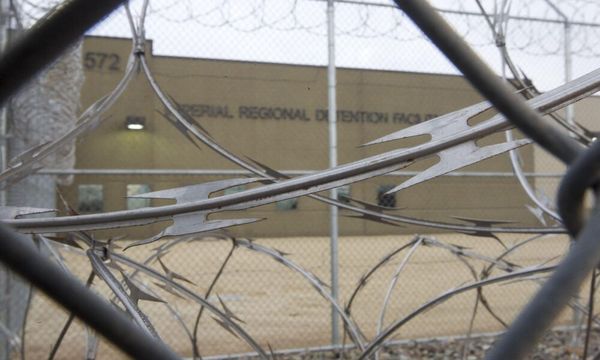
Whistleblower Richard Boyle will face a trial and potential prison term after judge Liesl Kudelka found his actions were not immune to prosecution under the Public Interest Disclosure (PID) Act.
Boyle’s case has been seen as a critical test of the law and its ability to protect whistleblowers. Kieran Pender from the Human Rights Law Centre (HRLC) said the decision showed that the law was “utterly broken”.
Boyle accused the Australian Taxation Office of aggressively pursuing debts from taxpayers and had fought to be protected from prosecution under the PID Act.
Kudelka said she found Boyle was “not protected” by the laws and dismissed his claim, meaning he will face a jury trial in October.
The reasons for her decision were put under an interim suppression order on the request of commonwealth prosecutors.
Boyle’s advocates, including the HRLC, have called on the federal government to drop the charges, as it did with those against Witness K’s lawyer, Bernard Collaery.
The HRLC warned that if Boyle was found not to be immune to prosecution, it would have a chilling effect on other would-be whistleblowers.
Pender said the decision was a “major blow for Australian democracy”.
“Whistleblowers should be protected, not prosecuted – and the PID Act was enacted to ensure just that,” he said.
“The court’s decision that Boyle’s whistleblowing on wrongdoing within the ATO was not covered by the PID Act shows that the law is utterly broken.”
When he was an ATO employee, Boyle grew increasingly concerned about the office’s aggressive debt collection tactics.
The Adelaide man tried to report his concerns internally, then to the inspector general of taxation. Nothing happened, so eventually he went public and appeared on the ABC’s Four Corners program to tell his story.
The charges against him – which he says came from when he was trying to collect evidence – included taping private conversations without consent and taking photos of taxpayer information.
Boyle sought protection under the PID Act after he went public. He was hoping to be granted immunity from prosecution over the 24 charges against him because they were part of the process of making a public interest disclosure.
The independent MP Andrew Wilkie said Monday’s ruling again showed the deficiencies in the PID Act. He said the government, which is intending to reform the act, should intervene to stop the prosecution until its review of the legislation is completed.
“Mr Boyle would never have been in this position if we had strong whistleblower protections in place,” Wilkie said.
“Whistleblowers are vital to a healthy democracy and should be protected not punished. This case reveals the urgent need for reform, including the creation of a whistleblower protection authority that covers both the public and private sectors.”
Former senator Rex Patrick, who advocated for Boyle when he was in office, said it was “hugely disappointing” for Boyle and for whistleblower protection in general.
The attorney general, Mark Dreyfus, could intervene at any time, Patrick said.
“He knows federal whistleblower laws are broken and yet he’s letting Richard hang out to dry for calling out power abuse inside the ATO,” he said.
“This will have a huge chilling effect. No one in their right mind would blow the whistle under the current whistleblower protection regime. You basically need to be a king’s counsel to be able to navigate the legislation properly. Whistleblowers are an important part of government accountability and anti-corruption work and therefore this decision can’t be let lie.”
Greens senator David Shoebridge also called for urgent reforms, including a whistleblower commission.
“It’s deeply distressing that Richard Boyle’s whistleblower protections have been shredded in court in yet another secret judgment,” the Greens’ justice spokesperson said.
“It is a shocking example of just how broken our existing whistleblower laws are and [shows] the urgent need for whistleblower reforms, including a whistleblower commission to give real protections for brave truth tellers.”
Dreyfus’s office said he could not comment on an ongoing court matter.
The government is currently attempting to pass priority amendments to the PID laws.
It will then conduct a second stage of reforms, which will examine whether the protections are unnecessarily complex, effective and accessible. The reform process is expected to include discussion of whether a whistleblower protection authority is needed.
During last year’s hearing, Boyle told the court he was worried that people were at risk of suicide from the stress of being chased for debts and that staff were pressured to be heavy-handed when collecting debts from taxpayers, even those who were ill or being abused.
He described one case where a woman fleeing domestic violence was still pursued by the ATO even though she hoped to pay her tax debt after selling her house.
The “vindictiveness and abusive management style” was “absolutely staggering”, he said, alleging he was bullied and that his treatment led to post-traumatic stress disorder.
The culture was so toxic that one of his managers was reluctant to approve his sick leave even after he was punched in the head, he said.
He alleged garnishee notices were used to keep forcibly taking money from debtors in an ongoing fashion, rather than one withdrawal, which was more usual. The money was sometimes taken without the debtors’ knowledge. Boyle was vindicated by official investigations, including an ombudsman’s review that found the use of garnishee notices was “excessive”.
“It would cause suicide and death in the community on a massive scale,” he told the court.
• Mental health support in Australia is available at Beyond Blue on 1300 22 4636, Lifeline on 13 11 14 and MensLine on 1300 789 978






